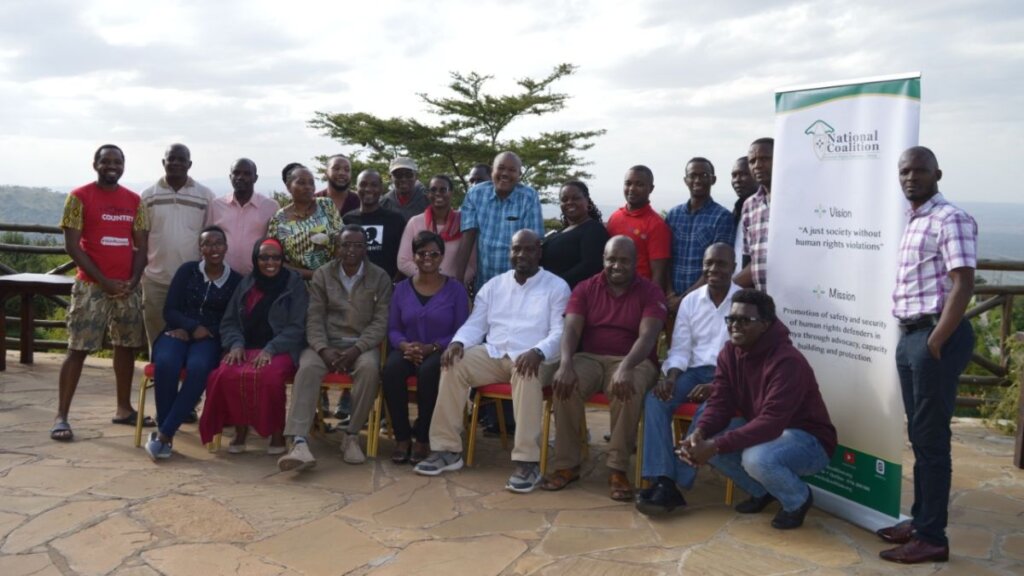Defenders Coalition to Launch New Strategic Plan 2020-2025

Defenders Coalition has for the last two months been in a process to develop its next 6 years strategic plan. The new plan will not only give the strategy direction for the organization but also human rights defenders approach in executing its new programs. The process of developing the new Strategic Plan is being spearheaded […]
PRESS STATEMENT ON THE INTERNATIONAL DAY OF VICTIMS OF ENFORCED DISAPPEARANCES
30 Aug 2019 Nairobi,Kenya DEFENDERS COALITION CONDEMNS THE ENFORCED DISAPPEARANCE AND KILLING OF HUMAN RIGHTS DEFENDER, ESTHER MWIKALI WAMBUA The United Nations declared 30th August as the day that would be observed globally as International Day for Victims of Enforced Disappearances to raise awareness that enforced disappearance is a crime, should not be used as […]
Submission to the UN Universal Periodic Review 35th Session of the UPR Working Group
Submitted on 18 July 2019 by: National Coalition of Human Rights Defenders-Kenya and Defend Defenders (East and Horn of Africa Human Rights Defenders Project) Introduction The National Coalition of Human Rights Defenders-Kenya (NCHRD-K), is a Kenyan CSO established in 2007. It works to strengthen the capacity of HRDs to work effectively and reduce their vulnerability […]
PRESS STATEMENT ON UNWARRANTED TARGETING OF HUMAN RIGHTS DEFENDERS WORKING WITH THE OGIEK COMMUNITY
June 2019 Nairobi Kenya The National Coalition of Human Rights Defenders – Kenya (NCHRD-K) strongly condemn the recent threats to human rights defenders from the Ogiek People’s Development Program (OPDP) in Nakuru County. There has been death threats against Mr. Kobei, the Ogiek People’s Development Programme Director, two other colleagues from the community leaders and threats […]
PRESS RELEASE ON THE ARREST OF HUMAN RIGHTS DEFENDERS HOLDING A PEACEFUL SOLIDARITY MARCH WITH THE PEOPLE OF SUDAN
19th June 2019 Nairobi, Kenya The National Coalition of Human Rights Defenders – Kenya (NCHRD-K) strongly condemns the arrest of two Human Rights Defenders (HRDs), Davis Malombe and Julius Kamau, who were taking part in a peaceful demonstration, (#IAmTheSudanRevolution) in solidarity with the people of Sudan, calling an end to the mass atrocities being committed by […]
COASTAL KENYA HRDs EXCHANGE PROGRAM
Nchrd Kenya, in partnership with MUHURI and Civil Society Reference Group Kenya CSRG K are conducting a one week mentorship and exchange program for the coast Human Rights Defenders Networks in Lamu, Tana River, Kilifi, Taita Taveta, Kwale and Mombasa counties. The mentorship is also being done to community members that are represented in the […]
Human Rights Defenders Awards 2019: Call for Nominations
INTRODUCTION Civic space in Kenya continues to be under pressure as a range of actions are being directed against the work of Human Rights Defenders (HRD) and Civil Society organizations in Kenya. Physical attacks, criminal and administrative actions, legislative restrictions, negative rhetoric and limitation of human rights have undermined the Constitutional and international protections available […]
Research Report: Supporting Assembly Rights in Africa
Although democratic and governance structures in Southern and East Africa unquestionably have transformed since the advent of multi-party democracy, true political inclusion remains an aspiration and not an achievement. This is evident from the increasing suppression by the State of civil and political rights such as the right to freedom of assembly and related rights […]
VIOLENCE METED ON SECURITY OFFICERS IN THARAKA NITHI INEXCUSABLE
PRESS STATEMENT 2nd May 2019 The Police Reforms Working Group-Kenya would like to strongly condemn the gruesome murders of Kamaindi Location Chief Japheph Mayau Mukengu and the Chuka Officer in Charge of Police tation Mr Joshua Kinyua. According to media reports, Chief Mayau was hacked to death by angry locals from Kamaindi who allegedly accused […]
You Will Not Be Charged to Acquire a P3 Form
No medical facility or police officer should charge you to obtain a P3 form. The Court in its ruling noted that the Poliuce Charter states P3 as a free document. It has further been established that there are some police stations who are in compliance with the charter and give the form free of charge. […]


